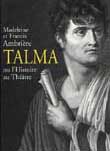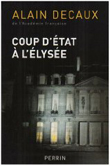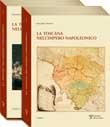| |
| |
For 2008, the Fondation Napoléon's annual HISTORY PRIZES for works of history on the two French empires have been awarded to the following authors:

|
|
|
| |
FIRST EMPIRE 2008
Madeleine Ambrière: Talma, ou l'histoire du théâtre, Editions de Fallois
This life of François-Joseph Talma is part history, part theatre, and part novel and as such rather like the hectic, contradictory, fascinating century in which the actor lived. Indeed the troubled, ever-changing times are brought to life again in the pages of this great actor's story, from the last breaths of the Ancien Regime to the waning Restoration, with, of course, the Revolution and the saga of Napoleon that came between. The story (which was written using many previously-unpublished documents) comprises nearly a century of French social history. It is the account of a society caught between the desire for change and cautious conservatism. Their hopes, illusions and problems are not that far removed from our own: generational clashes, rivalries, struggles for influence and financial debt...

|
|
|
| |
SECOND EMPIRE 2008
Alain Decaux, of the Académie Française: Coup d'état à l'Elysée, Editions Perrin
The Coup d'Etat on 2 December 1851 greatly divided the French people. After more than 150 years, the time has come to put aside partisan perspectives and, through the sources and eye-witnesses, uncover the real historical truth of the event. Here the coup d'Etat is described hour by hour, indeed minute by minute. Alain Decaux narrates with skill and objectivity the long preparation for the coup, the four-day-long coup itself - sixty thousand troops against the barricades - and the final crushing of the insurrection. The reader becomes an eye-witness, almost a participant in the story. On 2 December 1851 two sentences were found stuck to the walls of Paris: "The Assemblée nationale has been dissolved. Universal suffrage is re-established." Did the idea for the coup d'Etat really take shape in 1851, as an opportunistic reaction to the political situation at the time? Or was it not rather Louis-Napoleon Bonaparte's carefully considered intention, fuelled by thirty years of exile? He had barely reached the 'age of reason' when he saw his uncle, Napoleon I, on the eve of leaving for Waterloo. His uncle considered him thoughtfully, after which Louis-Napoleon heard him murmur: "Maybe he is the future of my dynasty?"

|
|
|
| |
BOOK IN A LANGUAGE OTHER THAN FRENCH 2008
Edgardo Donati: La Toscana nell'impero napoleonico. Tomo I e II, Polistampa
The annexation of Tuscany to the French empire was exceptionally important in the history of the Italian peninsula. The ‘French' government was to introduce methods of social control that had never before been seen in Tuscany and which would have a profound effect on the region. In his masterful two-volume book, Edgardo Donati has two main themes. The first is this attempt to introduce in Tuscany the fundamental structures of an 'administrative monarchy', with the creation and promotion of a professional class of administrators who would serve in a better-structured government. The second is a case-study of the work of Giovan Battista Nomi, the sous-prefet first of Arezzo and then of Pisa. These two areas of study (on the one hand the legislative activity, and on the other a case-study of the particular actions of an administrative elite) offer a striking vision of one of the Empire's experiments. Regime changes are never easy. In this particular case, a small kingdom was absorbed (almost overnight) by a gigantic state structure and subjected to the will of a faraway power. Admittedly, opposition, as much to taxes as to the conscription, was fierce, but eventually the region was "pacified" by a subsequent change: the arrival of the emperor's sister, Elisa, and the transformation into a grand duché.

|
|
|
| |
RESEARCH GRANTS 2008
Every year, grants are awarded to students beginning PhDs on First or Second Empire subjects. This year the following research projects were supported:
First Empire
• Florence Le Bars: The French and the Archaeology of the Kingdom of Naples during the decennio francese (1806-1815): the example of ancient ceramic discoveries
PhD thesis supervised by Agnès Rouveret and Carlo Gasparri, Paris X Nanterre and Università degli Studi di Napoli Federico II
• Fabien Menant: The “députés” of the Corps Législatif during the Consulate and the Empire 1799-1815
PhD thesis supervised by Jacques-Olivier Boudon, Université Paris IV - Sorbonne
• Michel Roucaud: Operational military intelligence during the Consulate and the Empire (1799-1805)
PhD thesis supervised by Bernard Gainot, Université Paris I Panthéon - Sorbonne
Second Empire
• Xavier Mauduit: The ‘maison du prince-président' and the ‘maison de l'empereur' 1848-1870
PhD thesis supervised by Christophe Charle, Université Paris I - Sorbonne
• Michaël Vottero: Genre painting in France during the Second Empire and the initial years of the Third Republic (1852-1878)
PhD thesis supervised by Barthélémy Jobert, Université Paris IV - Sorbonne
First and Second Empire
• Stéphane Faudais: Adolphe Niel (1802-1869). A Maréchal de France and his struggle against the illusion of a ‘victorious' France
PhD thesis supervised by Hervé Coutau-Begarie, EPHE
• Raphaël Lahlou: The Abbatuccis: a Corsican political and military family in the wake of the Bonapartes (1750-1880)
PhD thesis supervised by Jacques-Olivier Boudon, Université Paris IV - Sorbonne
The Fondation Napoléon Grand Prix and History Prizes 2007 will be awarded on Tuesday 9 December, at a lunch in the presence of HIH the Princess Napoléon.

|
|
|
|
|
|
|
|
|
|
The Fondation Napoléon Grands Prix, the fruit of the generosity of the industrialist, Martial Lapeyre, are awarded by a jury composed of the following specialists:
• Victor-André Masséna, Prince d'Essling (President)
• Jean-Claude Lachnitt (general secretary)
• Anne Muratori-Philip
• Gabriel de Broglie, of the Académie Française, and Chancelier of the Institut de France
• Jean-Marie Rouart, of the Académie Française
• Jean Favier, of the Institut de France
• Professor Jean Tulard, of the Institut de France
• Professor Jacques-Olivier Boudon, president of the Institut Napoléon
• Professeur François Crouzet
• Professeur Bruno Foucart
• Jacques Jourquin, vice-president of the Institut Napoléon
• Docteur Jean-François Lemaire
Four Grands Prix, each of 8,000 Euros, are awarded. Of these four prize-winners, the jury then chooses the overall winner, the “Grand Prix de la Fondation Napoléon”, awarding a further 7,000 Euros.
Click here for the previous winners.
Furthermore, the same jury awards awards six research grants worth 7,600 Euros to six French or non-French students in the first year of their PhD (or MPhil intending to go on to PhD) on First or Second Empire subjects.
Click here for the previous research grant winners.<<
|
|




